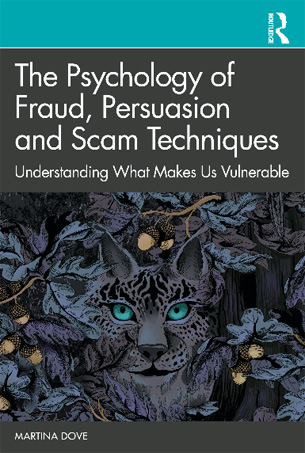Author: Martina Dove
ISBN No: 9780367859565
Review date: 23/04/2024
No of pages: 172
Publisher: Routledge
Publisher URL:
https://www.routledge.com/The-Psychology-of-Fraud-Persuasion-and-Scam-Techniques-Understanding-What/Dove/p/book/9780367859565
Year of publication: 07/12/2020
Brief:
Nigerian or advance fee frauds. Identity and synthetic fraud. Romance scams. Phishing and other social engineering attacks. Psychic or clairvoyant scams and cold readings. Miracle cures Charity scams and crowdfunding campaigns. Lotteries, prize draws, sweepstakes and giveaways. Investment or business opportunities and job scams. Sextortion and extortion scams. Food fraud, even; for UK readers, that is the horse meat scandal. The author says that she ‘cannot cover every possible scam’, but she has made a good try.
Shopping online, selling and buying through classified adverts, banking; all these activities that are likely to be exploited by scammers. Where there is money to be made, there is fraud, and fraudsters will stop at nothing to make money. That is the message in this short but punchy book. The author begins with her experience of being defrauded when buying a mobile phone, on ebay. Even though she (eventually) got a refund, purchased a phone and moved on, she would periodically have flashbacks of the incident ‘and it made me question motivations of anyone I did not know’. As that suggests, the cost of fraud is not only financial – though it can be a pension or entire life savings; but emotional – the victim’s feeling of shame, anger and disappointment; of trust violated.
“My fraud was not even that sophisticated. Many people go through frauds that are socially engineered to enhance compliance, in which a scammer may pretend to be a friend over a course of many months, building trust and creating plausible scenarios. Or they may engineer highly effective and believable phishing emails. And all the time they are getting better at creating scams that target what makes us human: social norms, personality characteristics, behaviours and circumstances.”
That’s the cue for the author to take us through types of frauds and scams; and how the fraudsters deceive us; prey on our cognitive biases; and how we communicate and make decisions. We’re also taken through our illusions, such as that good things happen to good people, and bad to bad, justice or karma in a word; but it does not necessarily happen. Fraud victims do not ‘deserve it’; they do not fall victim because they are silly or greedy; the reality is only about vulnerability; intelligence is not enough to inoculate yourself from frauds. “The more scams you are exposed to, the more likely it is that one will resonate with you and work.”
The Psychology of Fraud takes us through persuasion and scamming techniques; and, the ‘human factors’. That sets us up for a happy or at least hopeful ending – learning how to spot scams. For remember: “In reality, fraud can happen to anyone.”
If you are in the field of info-security, you may want to pull out chapter seven, on ‘human factors’. For example, we are told: “Many organisations believe that as long as they have good security protocols in place, this is enough to ward off cyberattacks. Many do nothing to address human factors that can greatly compromise the security of the whole organisation. Security protocols are often ineffective when it comes to protection from cyberattacks, mostly due to the fact that people either ignore the advice or put themselves at a greater risk by engaging in behaviours that lead to cybercrime.”
While it only may take one individual to click on a phishing email or fall for a convincing social engineering email or telephone call, and ‘the abundance and complexity of security advice is causing security fatigue, leading to avoidance’, so the author suggests; at least thanks to this book we can have an awareness. Ignoring security warnings can raise your vulnerability; also of note for the security manager reader, ‘what we share on social media can be of particular concern, as birthdays, friends-lists and photographs can be used by scammers’.










